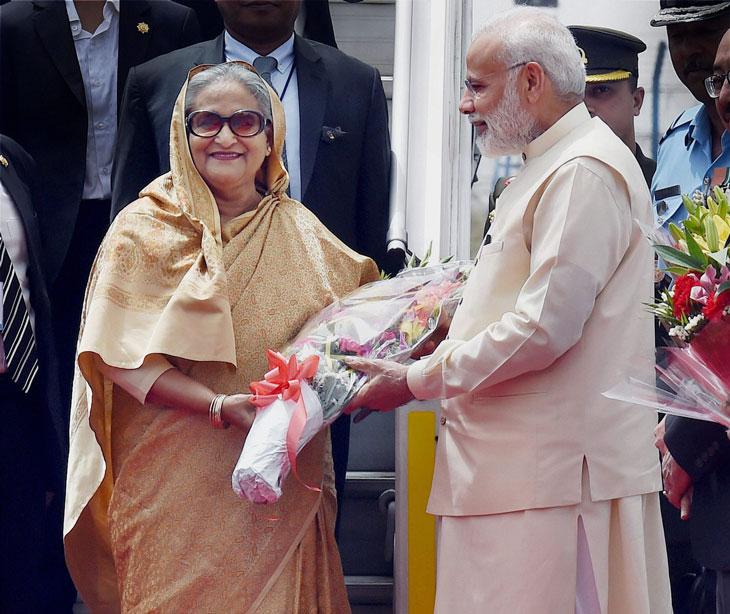What’s on India and Bangladesh’s agenda during Sheikh Hasina’s visit

One of the most important diplomatic engagements for Prime Minister Narendra Modi this year begins today with Bangladeshi Prime Minister Sheikh Hasina visit to New Delhi.
It is Hasina's maiden bilateral visit to India since she was elected again to power in January 2014. Prime Minister Modi had visited Dhaka in 2015.
Several agreements
The Ministry of External Affairs says more than 20 agreements will be signed between both countries when Hasina meets PM Modi on 8 April. This includes an important agreement on cyber security and another one on civil nuclear energy cooperation. Bus and rail links between the two countries are also on the agenda, according to the MEA.
The important agreement on Teesta Water Sharing, which remains an irritant, may not see the light of the day during the upcoming visit.
The inter governmental agreement on civil nuclear energy cooperation that would include building nuclear plants and shoring up capacity, would lead to trilateral cooperation between India, Russia and Bangladesh, since the Russians are already involved in the Kudankulam project in India and had signed a deal with Bangladesh way back in 2015 for building two nuclear power plants. India signed a similar agreement with Sri Lanka recently.
The agreement on cyber security, meanwhile, would add to the already strong relationship between the security agencies of both the countries, with regular exchange of information. Bangladesh has firmly acted on the anti-India groups using its territory. Despite the rise of radical outfits in the country, with attacks becoming a routine, Prime Minister Hasina has been firm in dealing with them.
Defence cooperation
Two important Memorandum of Understandings on defence cooperation are also expected to be signed.
Sripriya Ranganathan, the Joint Secretary in the MEA in-charge of Bangladesh and Myanmar, says the first MoU would provide a framework for the defence cooperation, while the second one would explore the possibilities of Bangladesh sourcing some of its defence supplies from India.
After Manohar Parikkar, the then defence minister, visited Dhaka last year, the new Army Chief General Bipin Rawat, too, was in the Bangladeshi capital recently to fine tune the extent of the cooperation.
India is looking up to shoring up its defence ties with Dhaka to offset the massive defence outreach of the Chinese in the neighbourhood. Not too long ago, Beijing had supplied two submarines to the Bangladeshi armed forces beside promising $25 billion in investments setting off alarm bells in India.
India is also set to announce at least a $500 million line of credit during Hasina's visit, according to MEA sources. Ranganathan says while the exact size of loan is a work in progress, it is expected to be on the same terms as the past few loans. And that Government of Bangladesh may decide where they want to use it. India has already extended as much as $3 billion in highly concessional loans to Bangladesh, according to the figures provided by the MEA.
Teesta Water Sharing

While the Hasina government is under tremendous domestic political pressure on the Teesta Water Sharing Agreement, it may have to wait for the mandarins in the MEA say that it continues to be a work in progress. Sources say that while they understand how public opinion in Bangladesh is in favour of an early resolution, it is unfortunate how Teesta has become a primary focus when there are 54 other rivers.
West Bengal Chief Minister Mamata Banerjee, who has raised a red flag over the agreement, will be in New Delhi on 8 April, to attend a function and subsequently the Prime Minister's Banquet for Sheikh Hasina.
Whether this meeting manages to break ice on the issue remains to be seen.
However, the Centre has made it clear that it cannot act without taking West Bengal on board. Ranganathan made it clear how the agreement needs to have “unstinted support from the West Bengal government” before it is signed. MEA sources claim to be waiting for a response from the state government over the terms of the agreement.
Rohingya refugees
It is not clear whether the issue of Rohingya refugees, another common concern for the both the countries would come up during the talks. While the Home Ministry says it is looking for ways to deport illegal Rohingyas who have settled in India including in Jammu, the MEA says it has offered help to the Myanmar government to stabilise the Rakhine state.
Ranganathan says India had offered monetary support to restore communal harmony in the restive province. And that while the Myanmar government had welcomed the offer, they would come back with specifics on the nature of assistance they need from India. “Our approach is really to help rather being judgemental,” Ranganathan said.
First published: 7 April 2017, 15:34 IST





![BJP's Kapil Mishra recreates Shankar Mahadevan’s ‘Breathless’ song to highlight Delhi pollution [WATCH] BJP's Kapil Mishra recreates Shankar Mahadevan’s ‘Breathless’ song to highlight Delhi pollution [WATCH]](https://images.catchnews.com/upload/2022/11/03/kapil-mishra_240884_300x172.png)

![Anupam Kher shares pictures of his toned body on 67th birthday [MUST SEE] Anupam Kher shares pictures of his toned body on 67th birthday [MUST SEE]](https://images.catchnews.com/upload/2022/03/07/Anupam_kher_231145_300x172.jpg)






